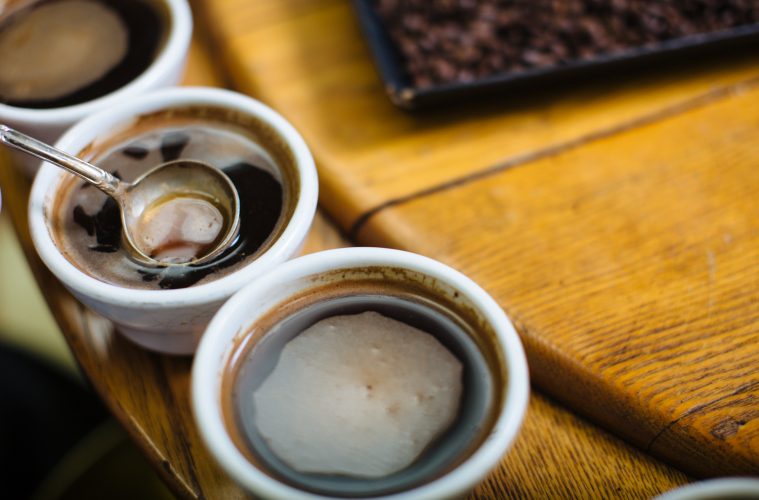Ninety-year-old Steve Kaloyanides, Sr., has already had a couple of cups of coffee by the time he arrives at work each day around 10:30 a.m. at New England Coffee in Malden, but there’s always room for more. For 70 years—since he got out of the Navy in 1946—Kaloyanides has been devoted to New England Coffee, the company his father, Menelaos, his Uncle George, and their cousin, Megaklis, founded in Boston in 1916. He tries to get in to work five days a week to taste and sample the product to help ensure that the quality will remain as good as it has been for 100 years.
“This is what I’ve been doing for 70 years,” Kaloyanides says. “I enjoy doing it, and that’s why I do it.”
It’s that dedication to quality that has made New England Coffee stand the test of time.
The company was founded as the New England Tea & Coffee Company in 1916 by the two Greek brothers and their cousin, who delivered coffee to restaurants in Boston using a horse and wagon, says Melissa Gilreath, brand manager of New England Coffee. One hundred years later, New England Coffee is still a major supplier of restaurants, with more than 10,000 food service customers not only in Boston but throughout New England and much of the Northeast. It’s also expanded into dozens of retail markets, allowing consumers to buy New England Coffee in grocery and other stores.
The company has grown and changed in other ways, too, since its founding 100 years ago, perhaps most significantly by being acquired by New Orleans–based Reily Foods in 2013. The acquisition was a good fit for Reily Foods, itself a more-than-100-year-old family business, says Michael Morse, vice president of marketing for Reily Foods.
“First and foremost, you had two family-owned companies that had been around for quite some time,” Morse says. “Both had roots in being family-owned and being very proud of the brands that they represent and that they manufacture.” In addition, Reily Foods started out in the coffee business itself.
Despite a century’s worth of changes and growth for New England Coffee, though, “What’s stayed the same is probably what’s most important,” Morse says. “There’s simply no skimping on coffee.”
The quality control team, including Kaloyanides, who’s now a consultant, still does the ever-important “cupping”—sipping and sampling the coffee—through every step of the roasting and grinding process, every day, to make sure that it’s up to snuff.
“This continual quality assurance is tried-and-true, and they’re doing it the same way they did it 100 years ago,” Morse says.
Other things have remained unchanged, too. Although the equipment and output are certainly bigger and more high-tech, achieving perfectly roasted New England Coffee isn’t simply about punching numbers into a machine. Its roasters still use their experience and expertise every day.
“We have people manning the roaster machines,” Gilreath says. “They actually can listen for the first crack of the bean, and they know that it’s reached the perfect roast.”
Also unchanged are the distinctive blends—made from 100 percent Arabica beans primarily sourced from Central and South America—that have made New England Coffee such a time-tested favorite. In fact, the Breakfast Blend, which Kaloyanides developed 40 years ago, is the company’s most popular blend.
“We blend the different types together to create the blend that we want,” Kaloyanides says. “We’re fussy customers in the industry.”
Over the years, that fussiness has led to many other blends and flavors, from dark Italian and French roasts to the light and mellow Donut Shop Blend to flavored coffees.
“Flavored coffees are definitely something we’ve perfected over the years,” Gilreath says.
Although New England Coffee customers certainly love typical flavors like French Vanilla and Hazelnut, many of the company’s most popular flavors are quite distinctive, like Blueberry Cobbler (“It smells like you just baked blueberry muffins,” Gilreath says), Pumpkin Spice, Chocolate Cappuccino, Cinnamon Sticky Bun, Tropical Coconut, and Pistachio Ice Cream. Other flavors are even more fanciful, like Birthday Cake, Hawaiian Macadamia Nut, and Boston Cream Pie. Some of these flavors are offered at retail, while others are offered through New England Coffee’s foodservice division or direct to consumers through the website, newenglandcoffee.com.
Another thing that hasn’t changed over the years is the company’s devotion to its customers. That, along with its ongoing commitment to quality, is why New England Coffee has survived and thrived for a century.
“It means that we’ve done something right all these years, and we’re very happy to be celebrating it,” Kaloyanides says. “Because quality is the key that we’ve always had and will always have.”
In fact, New England Coffee spent much of 2016 celebrating not only itself and its centennial but also its customers, with the “You Are Extraordinary” tour. Since March, a Fiat 500 decked out with a gigantic coffee mug on the back has been driving around to events and paying special visits to its customers throughout New England to say thank you, hand out free New England Coffee swag and samples, and show its deep appreciation for the “extraordinary people” who drink their coffee every day, Gilreath says.
The campaign sends the message that “You’re part of what’s made us 100 years old,” Morse says. “It’s been such a fun summer to see the road show go into these different towns and go into those communities.”
The company has also launched the brand-new Centennial Reserve, a blend of 100 percent Arabica coffee beans from Kenya and Ethiopia, to celebrate its 100th anniversary. The new blend is just the latest in a long line of coffee blends that have been created and maintained with loving care for 100 years, and it’s proof that the company will continue to innovate and expand while staying true to its roots.
“As long as we have a quality product we can sell to good customers,” Kaloyanides says. “That’s the key to the whole thing.”
New England Coffee
![]()

